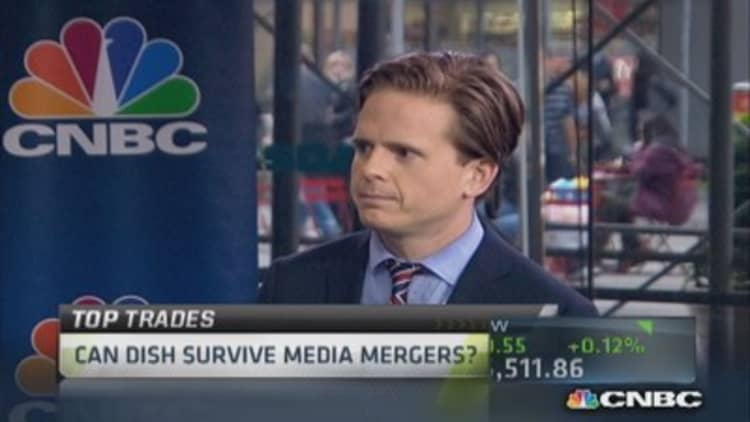
Dish Network Chairman Charlie Ergen is famous for outmaneuvering the media industry. But he may have just run out of good moves.
Over the weekend, AT&T agreed to purchase satellite-television operator DirecTV in a move that may create the country's second-largest pay-TV company by subscribers. While the deal had been mentioned weeks earlier in press reports, the formal announcement has almost certainly taken DirecTV rival Dish out of the major consolidation game.
Consider Dish's merger possibilities. While there are industry players with enough firepower to make a deal, there isn't much reason to justify a purchase of Dish. Charter Communications, for instance, could probably put together an offer, given it was recently on the verge of buying Time Warner Cable until it was outbid by Comcast, which owns CNBC parent NBCUniversal. But the synergies from such a deal would be minimal considering the differences between cable and satellite.
The more attractive deal would be between Dish and DirecTV, which could offer massive cost savings given the similarity between the two businesses. But Dish would now have to outbid AT&T. And such a satellite merger was proposed several years ago only to be blocked by antitrust regulators. It's likely regulators would have the same objection given that some subscribers in rural areas have access only to satellite. For such consumers, the pay-TV options would go from two to one.
Dish declined to comment to CNBC Digital.
Rather than a synergistic merger, investors are more likely concentrating on the spectrum Dish owns. The value lies in the potential to use the spectrum for a mobile phone network. The likes of Verizon and AT&T would surely like to have more spectrum to improve their services.
Indeed, Dish shares have doubled since the start of 2012, partly on speculation that Dish could monetize its spectrum. Dish's core business, if valued at five times forward earnings before interest, taxes, depreciation and amortization (EBITDA), is worth about $14 billion, according to Craig Moffett, ah analyst at MoffettNathanson. That suggests investors are putting an $18.5 billion valuation on Dish's spectrum, based on the latest market price.
Moffett said that such a valuation for Dish's spectrum looks too high unless an a buyer like Verizon appears to purchase it. Yet there are plenty of other spectrum owners who may be willing to sell at lower prices. Many local TV broadcast stations, for instance, own spectrum that could be used for mobile networks. Some of those stations currently receive no fees from cable and satellite operators and are desperate for a new source of income. A Verizon spokesman declined to comment.
Read MoreWhat could kill the AT&T-DirecTV deal: Losing NFL
Short of an outright sale, there is a possibility that Dish could team up with a company like Sprint and let the carrier use the spectrum for its network. Citigroup analyst Jason Bazinet said Dish might lease its spectrum or even find a way to enter the wireless business itself, though that would be a "long slog."
Another approach would be for Dish to purchase T-Mobile USA. But that would likely involve Dish paying a premium to get a deal done. Indeed, the process could well be competitive given Sprint's well-known interest in purchasing T-Mobile.
In the meantime, satellite TV remains a tough business. Unlike cable companies that can easily offer broadband Internet, Dish can't provide such a high-quality service through satellite. Satellites essentially send out data in one direction.
Satellite's challenge is already visible in the numbers. U.S. satellite subscriptions are likely to fall 0.2 percentage point to 34.1 million in 2014, according to SNL Financial. The research firm expects larger declines in each of the next several years.
Read MoreHere's why we're getting together: AT&T, DirecTV
That likely has put pressure on Dish's profitability. The company's EBITDA margin will reach 19.9 percent at the end of 2014, down from more than 25 percent in 2011, according to FactSet.
Dish's Ergen, known for his strategic acumen, may find a way to turn his company's spectrum into gold. If not, the stock may be in for a slow bleed.

